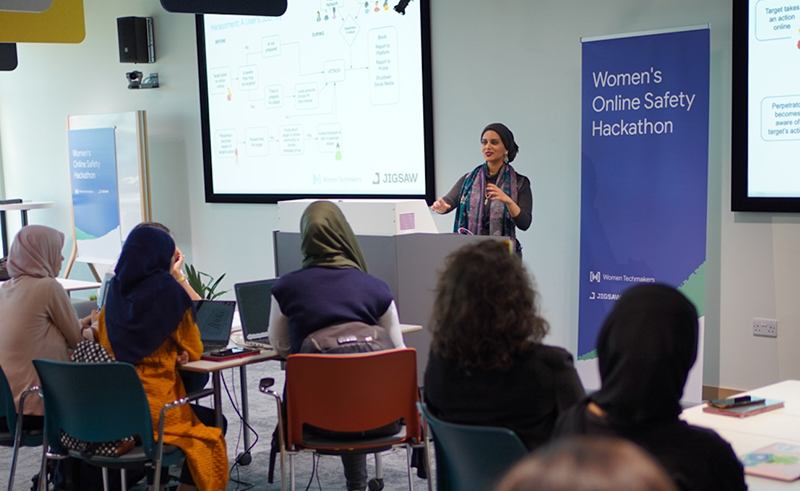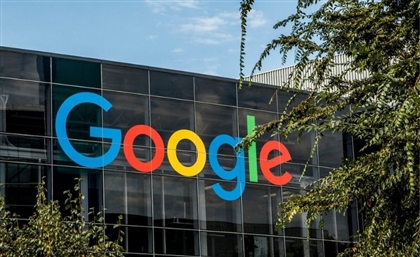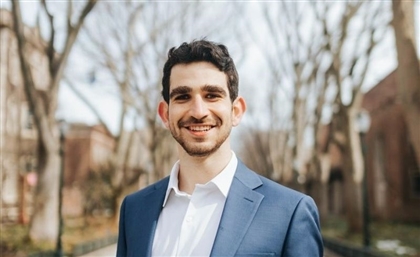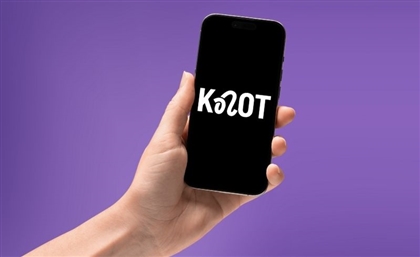Hacking Women’s Online Safety, How Arab Women Technologists Are Taking on the Challenge
Google’s Women Techmakers program brought 35 women tech experts from the Arab World to hack the issue of online violence, and raise awareness on online safety for women.

“I get this a lot: If you don’t want to be harassed online, don’t be online,” says Rayan AlZahab, Google Developer Expert. “People also ask, why aren’t there enough women in tech? Guess what - we need to feel safe online to learn about technology.”
There are many barriers to access the online world, including harassment, abuse and violence that many women experience. “Violence against women online is not a conversation that we’re having enough,” says Rana Abdelhamid, Global Marketing Lead for Google’s Women Techmakers, a global program by Google focused on providing visibility, community, and resources for women in technology. “There are many forms of online violence, including doxing, impersonation, stalking, surveillance, image manipulation, hacking of someone’s account, or tracking someone through geotags,” Abdelhamid explains.
One of the participants, Esraa Abdelnaby, for example, tells the story of how her computer was hacked by someone who offered to help her learn about internet security. He gave her USBs infected by multiple viruses, in the form of learning resources, to access her personal information. "He was spying on me, stealing my data and taking photos," she added. It was only because her parents believed that that kind of hacking was possible that they supported her, a reaction Abdelhamid highlights is not the case for every woman, and poses a major threat to women’s access rights and safety.
According to Dr. Djalila Rahali, an Algerian clinical cyberpsychologist; the impact of online violence can lead women to be depressed, stop working or studying, and experience self-harm. A study by Jigsaw, Google tech incubator and research hub, found that 28% of women who experienced online abuse purposefully reduced their presence online, and 75% of them changed their social media habits.
Violence against women online needs immediate actionable solutions across fields and sectors, and tech is increasingly proving an invaluable player. Earlier this year, Women Techmakers and Jigsaw brought 35 women tech experts from 17 Arab countries to participate in a hackathon event hosted by Google in Dubai. The objective of the event was to raise awareness on online safety and build tech solutions to combat online violence.
In the hackathon, seven teams built different solutions targeting awareness, prevention, and mitigating the impact of online violence. One of the teams came up with ‘Blockito’, a machine learning plugin that automatically detects and blocks any content that may include harassment and hate speech in real time, before the content is even posted. The plugin would amplify existing mechanisms of detecting violent language in social media platforms, enabling them to prevent the posts from being shared.
One of the common forms of online harassment and considered as a serious threat to women’s safety both online and offline is doxing, the practice of collecting and sourcing out private information of someone and publicly releasing them online.
Responding to this issue, one of the teams proposed a tech solution titled ‘SecuriScope’. It’s a web browser plugin that can be used to detect personal information such as age, ID number, bank account, and address, and warn the user that personal identifiable information is about to be shared and can be used against them.
‘AMENA’ was another idea presented during the event. It’s a virtual assistant that combines psychological assessment with voice engineering to help victims speak up and seek help, as well as provide steps women can follow to be safer online.
There were many other promising ideas that were presented during the event. The participants plan to apply the hackathon module in their own cities and communities to increase awareness, initiate discussions, and gather further ideas.
You can join the Women Techmakers community around the world by filling the online form. Members will have the opportunity to connect with a global network of women in technology, access resources and future events, as well as information and tools.
Online violence remains a global issue that hasn’t been under full control yet. Tech companies, experts, governments and individuals need to act together, to have a safer world online. Whether through tech solutions that could potentially combat violent acts online, or cultural conversations that are necessary, everyone needs to address this issue, the soonest.
Trending This Month
-
Jan 19, 2026






















